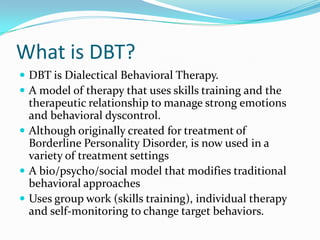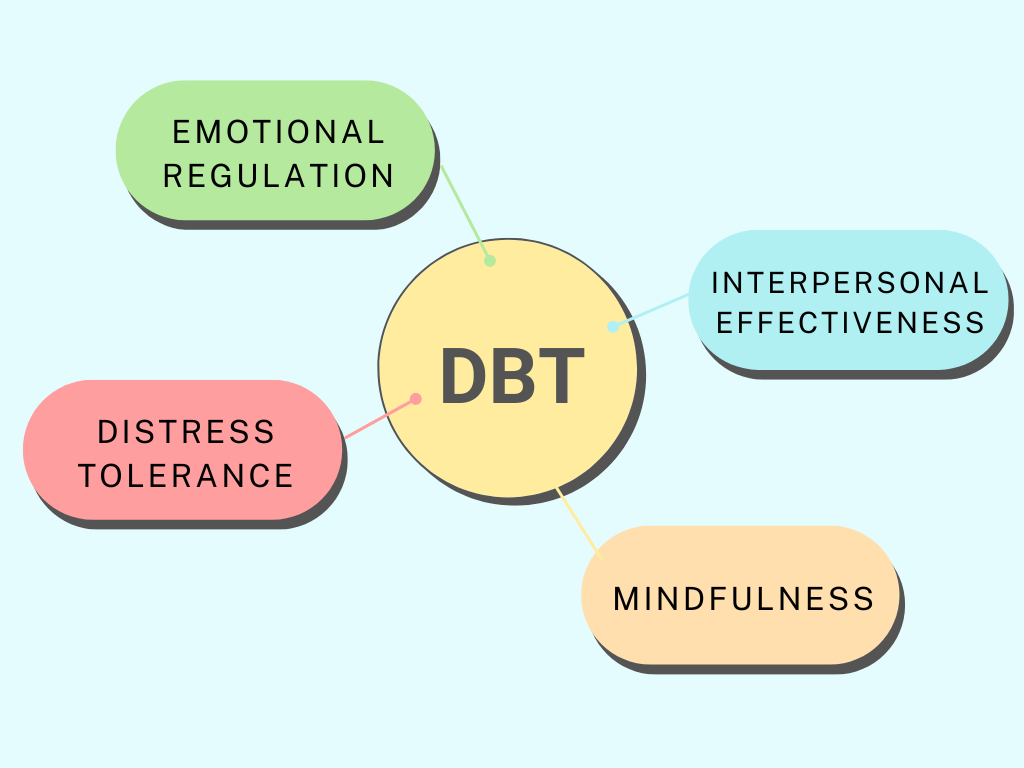Navigating Psychological Wellness: Dive into DBT London's Approach
Navigating Psychological Wellness: Dive into DBT London's Approach
Blog Article
Empowering Individuals Through Effective Dialectical Practices Treatment (DBT) Solutions: Building Stronger Mental Health And Wellness Foundations
In the world of psychological health and wellness and health, the relevance of encouraging people via reliable Dialectical Behavior Treatment (DBT) solutions can not be overemphasized. By focusing on the core concepts of DBT, such as improving psychological regulation abilities, improving social effectiveness, building distress tolerance methods, and growing mindfulness methods, individuals can embark on a trip towards building more powerful mental health and wellness foundations.
Recognizing the Core Principles of DBT


One core principle of DBT is validation. Therapists utilizing DBT recognize the patient's feelings and habits as legitimate actions to their environment. This recognition helps construct a strong therapeutic partnership and urges clients to work towards change. Another basic element is dialectics, which educates people to view situations from several perspectives and find the synthesis between conflicting ideas or feelings.
Moreover, the principle of dialectical abstinence is central to DBT. This concept encourages people to avoid self-destructive behaviors while also accepting themselves. By recognizing and incorporating these core concepts, specialists can effectively execute DBT techniques and assistance individuals in their journey towards psychological policy and mental wellness.
Enhancing Psychological Guideline Abilities
Establishing effectiveness in managing emotions is a basic element of fostering mental well-being and interpersonal efficiency - DBT London. Enhancing emotional law skills is a core component of Dialectical Behavior Treatment (DBT) that outfits people with the tools to browse extreme emotions in a useful and healthy and balanced manner. Through DBT, people discover to recognize, understand, and manage their emotions, leading to improved mental health outcomes
DBT highlights the significance of mindfulness, which entails existing in the minute without judgment. This practice enables individuals to observe their feelings without becoming overwhelmed by them, enhancing their ability to respond successfully as opposed to respond impulsively. By growing mindfulness, people can create a higher sense of self-awareness and emotional control.
In addition, DBT teaches useful skills such as distress resistance and emotion guideline strategies to assist individuals manage challenging emotions. By learning these skills, individuals can decrease impulsive habits, improve decision-making, and enhance their relationships with others. Eventually, enhancing psychological law skills through DBT empowers people to lead more satisfying and balanced lives.

Improving Interpersonal Effectiveness
Having actually developed a solid foundation in emotional guideline skills within the framework of Dialectical Behavior Treatment (DBT), the focus currently moves towards boosting interpersonal efficiency. Improving social efficiency is a critical element of DBT as it outfits individuals with the necessary skills to browse social communications, connect properly, set limits, and construct much healthier connections.
In DBT, interpersonal performance abilities are educated with modules that focus on areas such as assertiveness, effective interaction, and interpersonal analytic. By learning these abilities, people can boost their ability to share their desires and demands, keep self-esteem, and build stronger connections with others.
Exercising mindfulness is an indispensable component of improving social efficiency within the DBT framework. Mindfulness permits people to be existing in their interactions, pay attention proactively, and react attentively as opposed to react impulsively. By integrating mindfulness into their lives, individuals can cultivate greater self-awareness and psychological policy, which are essential for successful social communications.
Structure Distress Tolerance Strategies
Discovering reliable techniques for handling psychological distress is essential for people looking for to boost their coping skills and durability. Structure distress resistance techniques is a vital facet of Dialectical Practices Treatment (DBT) that empowers people to navigate difficult feelings without becoming overwhelmed.
Additionally, mindfulness methods play you could look here a substantial duty in building distress resistance. Mindfulness urges people to stay present in the minute without judgment, allowing them to observe their ideas and emotions without reacting impulsively. This awareness allows people to endure distress much more properly and create a higher feeling of control over their actions.
Along with these methods, producing a tailored distress tolerance plan with the guidance of a skilled specialist can give people with a customized method to taking care of emotional distress - DBT London. By including these methods right into life, individuals can reinforce their mental wellness structures and improve their total health

Cultivating Mindfulness Practices
To deepen their distress tolerance strategies additionally, people can concentrate on cultivating mindfulness techniques as a complementary approach within the framework of Dialectical Behaviour Treatment (DBT) Mindfulness, an essential part of DBT, entails focusing on today minute without judgment. By promoting mindfulness, individuals can boost their understanding of thoughts, feelings, and physical sensations, promoting a deeper understanding of themselves and their experiences.
Mindfulness techniques in DBT include methods such as mindful breathing, body scans, and observing ideas without add-on. These practices motivate individuals to develop a non-reactive stance in the direction of their inner experiences, allowing them to respond to difficult situations with better clarity and calmness. By integrating mindfulness right into daily routines, people can learn to manage their feelings much more properly, lower spontaneous habits, and cultivate a feeling of inner tranquility.
Via growing mindfulness methods, individuals going through DBT can develop a solid structure for managing anxiety, improving connections, and improving general well-being. By incorporating mindfulness into their restorative journey, people can establish important abilities that encourage them to navigate life's challenges with strength and self-awareness.
Conclusion
Finally, effective Dialectical Practices Treatment (DBT) services play a crucial function in equipping individuals to develop stronger mental health foundations. By comprehending the core principles of DBT, improving psychological law skills, boosting social effectiveness, building distress resistance techniques, and cultivating mindfulness techniques, individuals are furnished reference with the required tools to browse their emotions, relationships, and difficulties in a much more adaptive and resilient way. DBT solutions use a comprehensive method to promoting mental well-being and equipping individuals to lead satisfying lives.
By focusing on the core principles of DBT, such find out here as enhancing emotional guideline skills, boosting interpersonal performance, constructing distress tolerance techniques, and growing mindfulness methods, people can begin on a trip towards structure stronger psychological health and wellness foundations. Enhancing emotional policy skills is a core component of Dialectical Behavior Therapy (DBT) that furnishes individuals with the tools to browse extreme feelings in a healthy and balanced and useful way.In addition, DBT teaches useful skills such as distress tolerance and feeling regulation methods to help individuals manage difficult emotions.To deepen their distress tolerance techniques better, individuals can focus on growing mindfulness techniques as a complementary strategy within the structure of Dialectical Behaviour Treatment (DBT) By recognizing the core concepts of DBT, enhancing psychological law abilities, improving interpersonal effectiveness, building distress resistance techniques, and growing mindfulness practices, individuals are equipped with the required tools to browse their emotions, relationships, and difficulties in a much more resilient and adaptive way.
Report this page